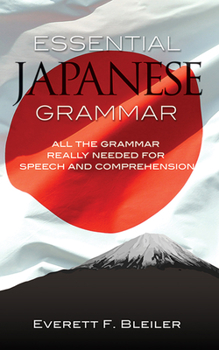Essential Japanese Grammar
Select Format
Select Condition 
Book Overview
Although not a member of the Indo-European language family, Japanese is not too difficult grammatically for an English speaker. It is astonishingly regular in its formations -- exceptions and... This description may be from another edition of this product.
Format:Paperback
Language:English
ISBN:0486210278
ISBN13:9780486210278
Release Date:June 1963
Publisher:Dover Publications
Length:156 Pages
Weight:0.40 lbs.
Dimensions:0.4" x 5.4" x 8.0"
Customer Reviews
3 ratings
Excellent analyses !
Published by Thriftbooks.com User , 16 years ago
This book gives brief, but excellent analyses of Japanese grammar with great analogy as well as insightful comparison between Japanese and English.
Good little grammar for my purposes
Published by Thriftbooks.com User , 20 years ago
My interest is in comparative and structural linguistics rather than in learning to speak, so I didn't mind that this is now a fairly old book and some of the information on current usage is dated. I'm not interested in speaking it so much as understanding a little more about how an Altaic family language works in more detail, as I already have a pretty good grasp of Han Chinese, Germanic, Slavic, and the Romance family grammars and patterns. And for that purpose this book was fine. For example, I learned that Japanese does not have a true future tense--you have to use a version of the present progressive for that--very interesting. In fact, Japanese has none of the complexity that Indo-European family languages show with respect to the handling of time and temporal relationships. However, it is much more complex in the area of modal or mood constructions, which signify a speaker's attitude toward the object, necessity, or probability. Japanese verbs are very regular and are not conjugated for person or number as in many languages, and the few irregular verbs can be counted on the fingers of one hand. What a dream--if only Spanish, Latin, Russian, and French were like that. In that regard, it's very similar to English--as well as Chinese. Another interesting area where Japanese differs radically from our pattern is that adjectives are conjugated to agree with the verb, rather than declined to agree with the noun, unlike English and the other Indo-European languages, and Semitic family languages like Arabic as well. For example, in Japanese you would say, "That sounds interestingly," for which in English you would say, "That sounds interesting," with the word "interesting" simply being a subjective complement rather than an adjective being treated like an adverb. But in Japanese the adjective agrees with the verb rather than the noun. Go figure. So overall, this was a nice introduction to the subject that filled a gap in my own background.By the way, in the last 20 years, since I was first studying linguistics, there has been considerable advance in the understanding of Ural-Altaic family languages and their relationships, and there are several good websites that have information on that. So if you're like me and want to pursue the subject further and don't have access to a fine linguistic library like at U.C. Berkeley or Indiana State University at Bloomington, you can find some of that on the web now.
Great Introduction - will get you around country.
Published by Thriftbooks.com User , 21 years ago
This book was my best tool for learning Japanese. I recommend getting the course with CDs or tapes if you can. This course will introduce you to most common words and phrases you will need, and you will need to apply yourself. I lived in Japan for about 7 years on and off. Japanese is a tough language. I was not fluant, but I had no problem tavelling without an english enterpreter, and I constantly received complements on my accent.I recomend the 'Essential Language' courses for any language.





